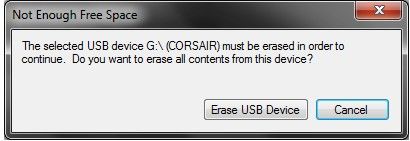

- #BOOT USB FLASH WITH TOTAL COMMANDER ARCHIVE#
- #BOOT USB FLASH WITH TOTAL COMMANDER FULL#
- #BOOT USB FLASH WITH TOTAL COMMANDER WINDOWS#

If you're afraid that this could sort the files incorrectly read In Bash, are wildcard expansions guaranteed to be in order? On Linux systems you can do so with: cat output.file.* > input.file Thanks to Gilles for this important addition.īefore you can access the file again you need to merge its parts first. The filesize of matches exactly the maximum file size of your FAT32 formatted USB drive, which is 4 Gibibyte (GiB, that's not the same as Gigabyte GB) minus 1 Byte. This will create the following files: 4,0G
#BOOT USB FLASH WITH TOTAL COMMANDER FULL#
See man split for the full documentation. for your case: split -b4294967295 /path/to/input.file /path/to/pen/drive/output.file.
#BOOT USB FLASH WITH TOTAL COMMANDER ARCHIVE#
Most archive managers come with the split option and for the command line there's split, e.g.

rwxrwxrwx 1 root root 0 Jul 10 15:15 /mnt/usb/test.If you don't want to reformat your USB drive or need it to be FAT32 you can simply split your big file into parts. rwxrwxrwx 1 root root 0 Jul 10 15:15 /mnt/usb/test.txt Touch: cannot touch `/mnt/usb/test.txt': Permission ~ $ sudo umount ~ $ sudo mount /dev/sda1 /mnt/usb/ -o ~ $ ls -l /mnt/ĭrwxrwxrwx 13 root root 4096 ~ $ touch ~ $ ls -l /mnt/usb/test.txt dev/sda1 on /mnt/usb type vfat ~ $ ls ~ $ touch /mnt/usb/test.txt dev/mmcblk0p5 on /boot type vfat (rw,relatime,fmask=0022,dmask=0022,codepage=cp437,iocharset=ascii,shortname=mixed,errors=remount-ro)

Tmpfs on /run/shm type tmpfs (rw,nosuid,nodev,noexec,relatime,size=76740k)ĭevpts on /dev/pts type devpts (rw,nosuid,noexec,relatime,gid=5,mode=620) Sysfs on /sys type sysfs (rw,nosuid,nodev,noexec,relatime) Proc on /proc type proc (rw,nosuid,nodev,noexec,relatime) Tmpfs on /run/lock type tmpfs (rw,nosuid,nodev,noexec,relatime,size=5120k) Tmpfs on /run type tmpfs (rw,nosuid,noexec,relatime,size=38376k,mode=755) dev/root on / type ext4 (rw,noatime,data=ordered)ĭevtmpfs on /dev type devtmpfs (rw,relatime,size=183620k,nr_inodes=45905,mode=755) However this is quite easy to fix using a couple of commands:Ĭode: Select all ~ $ sudo mkdir ~ $ ls -l /mnt/ĭrwxr-xr-x 2 root root 4096 Jul 10 15:05 ~ $ sudo mount /dev/sda1 ~ $ mount Who owns the files when the flashdrive is attached to your debian box? And what permissions do they have then? If (for example) the files are owned by your account (say it is called 'user') and the files are only accessible by 'user', then when you put the drive in the Raspberry Pi the user 'pi' isn't the user 'user' and won't be able to access them (actually it doesn't matter what the usernames are - rather the uid that they map to must be the same). (If you unmount again you'll see the /mnt/usb on the sdcard again and it will still have 777 permissions). The reason that changing the /mnt/usb folder to 777 doesn't work is that the /mnt/usb folder you created on the sdcard is hidden by the root folder of your flashdrive when it is mounted and it is then the permissions on the directories and files on the flash drive that matter. I'm assuming the flash drive is formatted using a linux filesystem (ext2/3/4 or similar) here, so both the debian box and the raspberry pi have a concept of ownership.


 0 kommentar(er)
0 kommentar(er)
